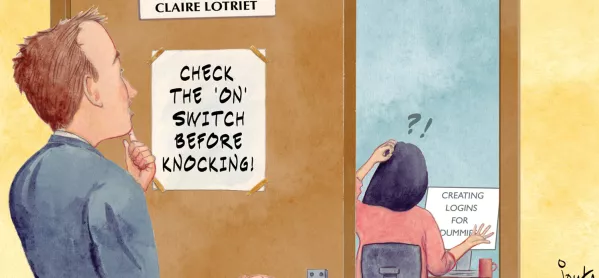I love computing. It’s one of my favourite subjects to teach. But I can’t lie: there are some downsides to being a computing coordinator. Here are my top five.
1. Creating logins
To be fair, this process varies depending on the online service, and some make it easier than others, but I have spent more time than I care to remember setting up login details for every child and member of staff in the school. I look forward to the day when doing this becomes a streamlined process that doesn’t fill me with dread - ed tech companies: please take note.
2. Setting up tablets
I have dealt with the set-up of an array of different types of tablet at school and they have all been painful in their own ways. From spending several days of my summer holiday organising a class set of tablets, one by one, because there was no system to synchronise them at the time, to speaking to far too many different people at another company to try and get permission to buy apps in bulk, I have experienced it all. Each time, I say to myself, “it should not be this difficult” - again, ed tech companies: please take note.
3. People confusing the role of computing coordinator with that of a network engineer
My specialism is planning and leading on the computing curriculum, not networking an entire organisation. Of course, some computing leaders will be able to do this, but it’s best not to assume that we all have the ability to troubleshoot the admin server, blindfolded. In Spanish.
4. Being asked to fix stuff that really doesn’t need fixing
If it has a plug attached to it, apparently it’s fair game to expect your computing coordinator to take responsibility for it - from speaking to teachers on Twitter, I know that this happens to lots of computing coordinators. So here’s my tip: check that it’s switched on at the plug first. If it is, then check the wires are pushed in properly. Give them a jiggle. I cannot tell you how many tech problems I have resolved with this method. Honestly.
5. Being told that children are better than teachers at computing and that’s that
Now, while many children are no doubt more confident than some teachers, it shouldn’t really be used as a get out clause not to work on our own skills. As @Millsey_5 pointed out on Twitter: “Just because they can play Candy Crush does not mean they’ll naturally be better at coding.” Indeed, programming also relies on logical thinking, decomposition and reasoning skills, which, hopefully, all staff can teach.
So, there you go. The life of a computing coordinator is a fun, but challenging one. Please do check the “on” switch before you ask for their help next time…
Claire Lotriet is a teacher at Henwick Primary School in London. She tweets at @OhLottie and blogs at clairelotriet.com




